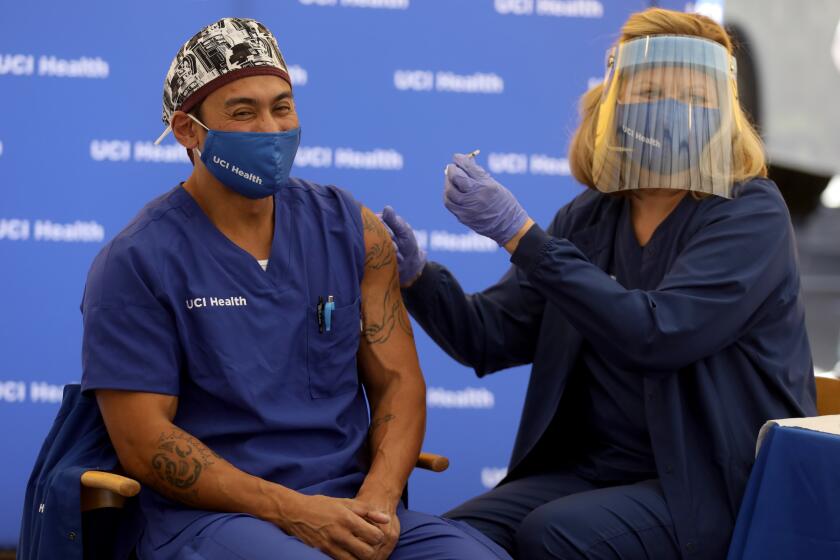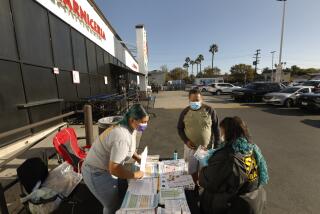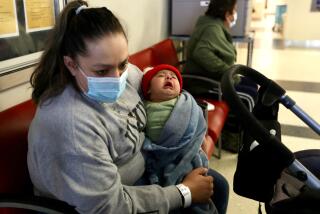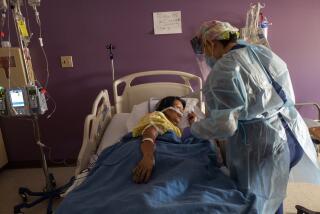Already ‘under siege,’ hospitals in L.A. County brace for far worse conditions in coming weeks
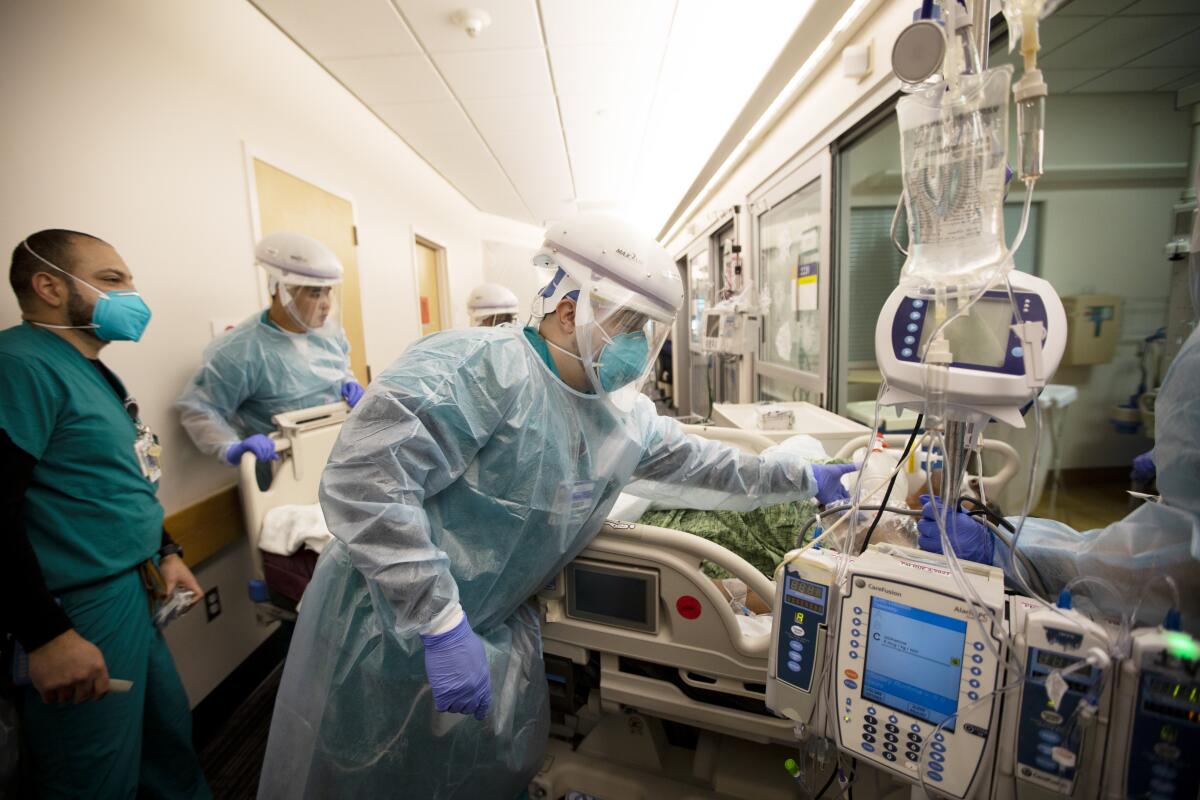
- Share via
With COVID-19 cases exploding across Los Angeles County, officials believe hospitals will be hit by a wave of patients in the coming weeks much larger than even the most dire forecasts and pushing the region’s medical infrastructure to the brink.
There are nearly 1,000 people with COVID-19 in L.A. County’s intensive care units as of Tuesday; forecasts say that by early January, there could be between 1,600 to 3,600 COVID-19 patients in need of ICU beds if virus transmission trends remain the same. There are only 2,500 licensed ICU beds in L.A. County.
“There are simply not enough trained staff to care for the volume of patients that are projected to come and need care,” said Dr. Christina Ghaly, the county’s director of health services. “Our hospitals are under siege, and our model shows no end in sight.”
Hospitals in L.A. County are filling up as never before. For much of September and October, about 100 patients a day with COVID-19 were being newly admitted into hospitals in L.A. County daily. Just before Thanksgiving, nearly 300 new patients a day were being admitted.
Now, there are about 600 new patients with COVID-19 needing hospital admissions daily, and officials expect that that could rise to anywhere from 750 new COVID-19 patients a day to 1,350 a day by New Year’s Eve.
“If the numbers continue to increase the way they have, I am afraid that we may run out of capacity within our hospitals,” added Dr. Denise Whitfield, associate medical director with the L.A. County emergency medical services agency and an emergency room physician at Harbor-UCLA Medical Center near Torrance. “And the level of care that every resident in Los Angeles County deserves may be threatened just by the fact that we are overwhelmed.”
The new forecast comes as L.A. County experienced new daily records in both COVID cases and deaths.
For the first time, a Los Angeles Times county-by-county tally found more than 50,000 new coronavirus cases and nearly 400 deaths in California reported in a single day. The Times survey Wednesday night found 51,724 new coronavirus cases reported in a single day, shattering the state’s single-day record broken on Monday, when 42,088 cases were reported.
Bracing for the weeks to come
Ghaly previewed what would happen if the healthcare system does become overwhelmed: exhausted doctors and nurses stretched beyond their capacity, increasing the chance that the sick will die and medical staff will be forced to ration intensive care unit beds, because the “system simply does not have the ability or the staff to provide the care for all those who need it,” Ghaly said.
Hospitals in L.A. County are desperately trying to free up hospital beds by discharging recovering patients as quickly as possible, but there is only so much longer that hospitals can stretch their staff to meet the demand until the quality of patient care starts to worsen.
The COVID-19 vaccine continues to roll out throughout Southern California.
“Many hospitals have already broken nurse staffing ratios, and their staff are not necessarily getting either the breaks or rest that they’re supposed to be getting,” Ghaly said.
There remain only about 100 available ICU beds in L.A. County, which is home to 10 million people. County scientists estimate that every infected person is now on average transmitting the virus to 1.2 other people — among the highest such number since the first weeks of the pandemic.
“So today in Los Angeles County, let me be clear: We have a problem,” Ghaly said. “And at this point all our hospital systems can do is brace for these days and weeks to come.
Emergency room doctor: ‘Worst that I have seen’
Dr. Whitfield said conditions are rapidly deteriorating.
“This is real,” Whitfield said. Of the past nine months of the pandemic, “it’s the worst that I have seen things in terms of looking at our capacity to care for our patients.”
As of the past weekend, Harbor-UCLA was still able to manage its COVID patients, but that overcrowding meant that some patients needed to stay in the emergency department when they should’ve been transferred elsewhere in the hospital.
“What that means is that when a patient needs to be admitted to the hospital, requiring either an ICU or an inpatient bed, that we just don’t have the staffing or the the actual bed space to to to care for them,” Whitfield said.
A backed-up emergency room then makes it harder for emergency physicians and nurses to take care of patients with other emergencies, including strokes, heart attacks and trauma.
‘I am afraid that we may run out of capacity’
Whitfield said she’s been an emergency room doctor for a decade, but the past weekend was the first time where she felt the overcrowding situation “has actually threatened that the the level of care that we can provide for our patients.”
The pandemic has exhausted the medical staff.
“We have worked firsthand, and personally, with sick patients that have had difficulty breathing. We have had to counsel family members with some uncertainty as to what might happen to their loved ones. And we have dealt with death,” Whitfield said.
“And so looking at ... how these numbers are increasing throughout the county, it’s really, really quite frightening to me,” Whitfield said.
“If the numbers continue to increase the way they have, I am afraid that we may run out of capacity within our hospitals,” Whitfield said. “And the level of care that every resident in Los Angeles County deserves may be threatened just by the fact that we are overwhelmed.”
Too few heeded warnings to stay home on Thanksgiving
Unfortunately, Ghaly said, too few people heeded the urgent pleas of health officials to stay home over the Thanksgiving holiday, and doctors and nurses around the country are now being inundated with those who contracted the coronavirus during that time.
“We are seeing the impact of what happened over Thanksgiving. It does not seem that enough people heard and followed the message: Stay home and avoid gathering with others,” Ghaly said. “transmission and new cases are soaring as a result of the holiday activity and the more general interactions and intermingling that occurred both before and after.”
More people are dying from COVID-19 in L.A. County than ever before in this pandemic. On Wednesday, 134 deaths were reported, as were 22,469 new coronavirus cases, according to an independent Times tally — both single-day records.
Both numbers were far above the weekly average for those numbers — about 13,000 coronavirus cases a day and 71 deaths a day, infections and fatalities that are occurring at double the pace from two weeks ago.
1 in 80 people in L.A. County are believed to be contagious with the coronavirus
Cumulatively, there have been more than 567,000 confirmed coronavirus cases and 8,572 COVID-19 deaths in L.A. County.
Turning around this crisis will be far harder than in the previous waves because the virus is so widespread, much worse than at any other point in the pandemic. An estimated 1 in 80 people in L.A. County are now contagious with the virus; that’s far worse than in late September, when county scientists calculated that 1 in 880 county residents were infectious.
“We can slow the spread of the virus but it will take immense effort,” Ghaly said. “We are still in for a rough few weeks at least, and potentially through January, if not beyond.”
The vaccine is coming too late to prevent this surge from happening, Ghaly said. “There is simply not enough doses in a short enough timeframe to make a difference among the general infection rate in the regular population.”
Ghaly urged that people cancel gatherings, such as birthday and Christmas parties.
“Things that were safe in the fall or that were safe even two months ago are not safe today,” Ghaly said. “Having a very small birthday party for your child in a park is not safe. Having a very small holiday gathering is not safe. Getting together with a couple of friends at dinner is not safe. Participating in a sports tournament, whether it’s formal or informal, is not safe.”
More to Read
Sign up for Essential California
The most important California stories and recommendations in your inbox every morning.
You may occasionally receive promotional content from the Los Angeles Times.
